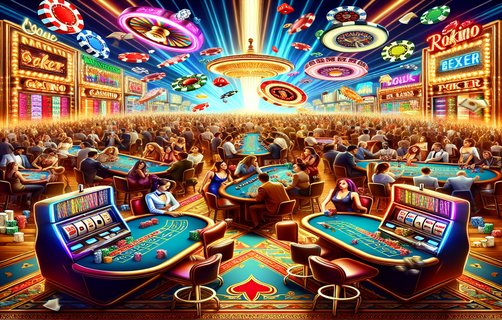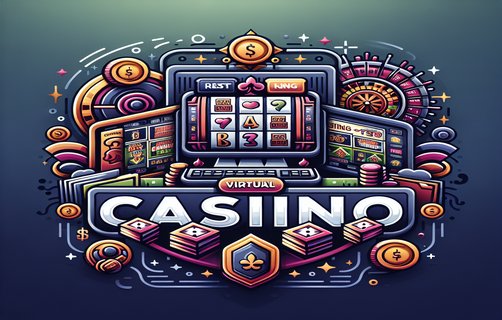The Unseen Costs of Digital Gambles: A Loser's Reflection on the Modern Casino Landscape
The alluring lights and the intoxicating thrill of winning can often lead us to make decisions that are less rational and more impulsive. In the realm of online gaming and gambling—where the flick of a finger can lead to flashing jackpots or devastating losses—the experience of the loser is seldom discussed in depth. While many may revel in their wins and celebrate their prowess, it is the downward spiral of the losers that serves as a cautionary tale about the darker side of games like carrom, slots, and poker, especially in environments like Poki games.
Bankroll management is fundamental in every gambling approach, yet it is often one of the first casualties when a player becomes emotionally invested in the game. The thrill of a near-miss can create an illusion of impending luck, leading players to disregard their original budget in pursuit of that elusive win. For many, losing becomes a catalyst for increasingly irrational behavior—chasing losses with reckless abandon. This misguided mindset can lead to devastating financial repercussions, as bankrolls dwindle and the excitement of gaming morphs into an obsession that threatens one's financial stability. The industry, with its carefully curated user interfaces and strategies aimed at prolonging the gambling experience, often encourages this detrimental behavior.
Among the various temptations available in modern gambling, none may be as alluring yet dangerous as the concept of the Jackpot King. These systems present the idea that within every game lies a chance for a life-altering payout. For the winner, the jackpot is a story to tell, an unforgettable moment. However, for many others, the relentless pursuit of this myth can lead to desperation and disillusionment. Sharing tales of wins becomes a social currency, burying the silent narratives of those whose wallets have been emptied in the chase for glory. The warm glow of a jackpot win provides a brief escape, while the losses linger like gray clouds, shaping a unique and often painful gaming identity.
Moving to the realm of mobile slots, the convenience of playing on-the-go adds another layer to the gambling experience. While players can easily engage with their favorite games anywhere, this ease can also foster compulsive behavior. Spending those few minutes waiting for the bus or during a lunch break can quickly turn into hours lost in the reverberating world of spins and wins. This accessibility blurs the lines between casual play and serious gambling, making it all too easy to lose track of time and, more alarmingly, money. The carefully engineered algorithms behind these games are designed to keep players engaged, drawing them into a digital vortex that can be hard to escape.
The phenomenon of high-stakes gambling further complicates the emotional landscape. This realm is appealing for a select few who willingly embrace the high-risk environment, but it is essential to recognize that many players are drawn in under false pretenses, believing they can follow the examples of the few who succeed. In Los Angeles, Sin City, and countless digital platforms, high-stakes games often create an image of glamour and escape. Yet, for the vast majority, these stakes yield crushing losses rather than delectable wins. The gap between winning and losing reveals the socio-economic disparities in gambling, underpinning issues of accessibility among different classes.
The advent of virtual reality casinos marks the future of gaming, offering players an immersive experience like never before. The potential for escapism is unbounded, but so too is the potential for deeper financial and emotional ruin. VR strips away the barriers between reality and fantasy, creating an environment where players can lose themselves entirely. The involvement in these environments often intensifies the feelings of loss, leading to a more profound sense of regret when faced with empty pockets and shattered dreams.
Equally troubling is the term exploiting fish, which refers to the predation of inexperienced players by seasoned gamblers. The poker table overlooks a chilling reality—one player's pastime is another's financial ruin. In this environment, it’s not uncommon for players to cunningly target those who are less experienced, profiting massively while communities fracture under the weight of losses. This predatory behavior offers a stark view of the modern gambling landscape, where the thrill of victory often comes at the expense of the vulnerable.


Finding support for those ensnared in this cycle of loss and addiction remains critical. Help centers and support forums are vital resources, yet the stigma associated with gambling losses often prevents individuals from seeking assistance. The detrimental perceptions attached to being a loser can overshadow the voices that should be amplified in discussions about responsible gaming. We must foster an environment where losers are not forgotten, where their narratives serve as valuable lessons warning future players of the unglamorous realities of their amusement.
Ultimately, as a community, we must face the allure of digital gambling with a discerning eye. By recognizing the unseen costs and hidden narratives behind the victorious façade, we can begin to unearth the complexities of modern gambling culture.
